ClientEarth Communications
29th November 2021


Two weeks on from COP26 and the dust is starting to settle. So what do environmental lawyers really think about the agreements made at COP this year, and what needs to happen now to meet them? We spoke to our Director of Climate and Energy, Maria-Krystyna Duval, for a look at COP from an expert’s perspective.
"The biggest headline I took from COP was the commitment between the US and China to work on decarbonisation. Within the current political climate, it was something that was unexpected and encouraging. I saw it as a promising emblem of countries putting their differences aside and coming together on a shared goal: the climate.
The most significant negative headline for me was that coal will be phased down rather than phased out. For me, this outcome is a reflection of richer countries not providing sufficient financial support to countries to transition to renewable energy. We won’t see coal disappear until financial and structural support is given to countries in the global South."
"Ever since COP21, it has received a lot of media attention. Media attention is positive but it also concerns me. It gives a distorted view of politicians’ actions. It is easy to think because it’s in the media that it is being discussed and backed with positive and actionable outcomes but very often that is not the case.
This COP was different because of the greater engagement from the private sector and the relevant disengagement of governments. As a citizen and a lawyer, I worry about governments washing their hands of the responsibility to act against climate change and passing it over to the private sector to handle the transition. We must not let this happen."
See more of our work on climate accountability
"The biggest challenge will be getting countries to commit to emissions reductions. We have had declarations on deforestation, and more pledges than ever, but no real reductions. There were also looming gaps that will need addressing – notably the transition for the agricultural sector and oceans. We focus a little too much on the ability of forests to absorb carbon versus the huge potential of oceans to achieve that."
Read more about the ocean as a carbon sink
"I am hopeful that the voices who deny that climate change is actually happening have almost disappeared. Even 5 years ago that was an issue. We are steering the ship in the right direction but nowhere near fast enough. It is a step change in the pace of action that we need to see."
"In a way, the amount of hope and hype that was placed in it. So much weight is put on these big international negotiations and we hold our breath until the next COP. But there is a significant opportunity cost attached to that. What smaller legislative change have we ignored while trying to get politicians’ attention around COP26? We are currently witnessing a weakening of multilateralism. We put so much energy in a forum like COP26 that smaller, regional, community based solutions are often over-looked when they hold such huge potential."
"Money. It is not 100 billion we need, but several trillion. Finance needs to be made available to help governments around the world combat climate change and adapt to its impacts. This should be seen as an investment, not a cost. We found the money for Covid and the recovery, now we need to find it for climate. We have no other choice.
Government discussions must involve ministers of finance, not just ministers of environment. Without the participation of finance ministries, a discrepancy will remain between commitments and action.
We also need to platform and amplify the voices of people in the fight – I have a particular passion for women & girls and making sure their experiences are heard as they are bearing the brunt of climate impacts."
"We have a huge role in combatting fossil fuels - a huge and looming problem. We have worked hard on coal, accelerating the coal phase out in Europe. Now gas needs to be at the heart of the conversation. And crucially, ClientEarth has the ability to help organisations transfer their COP26 commitments into actionable and accountable pledges."
Maria oversees our programmes in Asia and the United States, as well as our energy, fossil fuel and agriculture teams. She has advised the New Zealand Government on the economic, social and wellbeing impacts of environmental policy, spent years advising in private practice on international human rights and law, and has worked for several organisations on women’s economic empowerment and development.